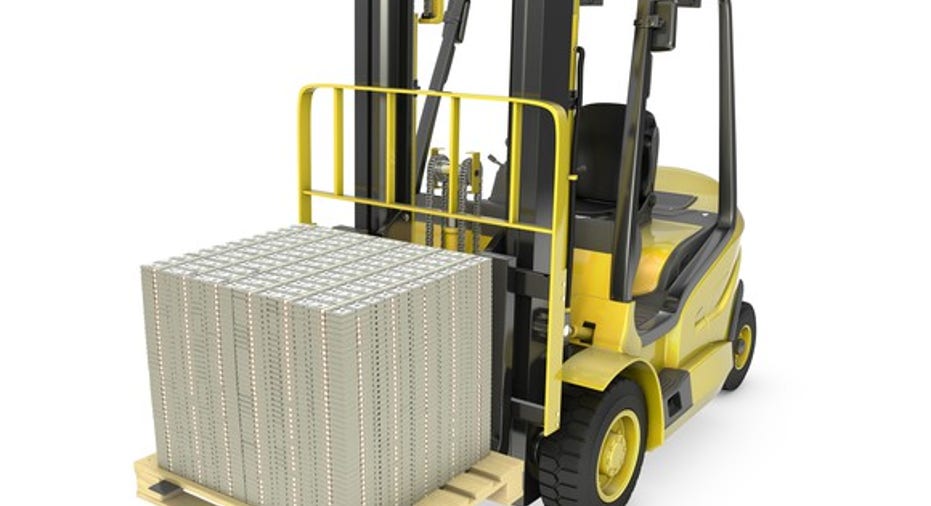Defense Aid for Israel Could Mean Profits for Boeing and Raytheon

Washington is getting ready to deliver a big load of cash to Israel. Image source:Getty Images.
If I told you Washington is gearing up to deliver a big load of cash to Israel, to pay for military purchases, would that surprise you?
If you've been keeping up with the news,probably not. But here's something that may surprise you: Much of the money America is planning to "give" to Israel as military aid is actually making a U-turn -- and coming right back into the pockets of U.S. defense contractors Boeing (NYSE: BA) and Raytheon (NYSE: RTN).
The news
Last month, the Obama administration asked Congress to increase the level of annual U.S. military aid to Israel from its current level -- about $3 billion a year -- to as much as $40 billion over 10 years. The U.S. Office of Management and Budgetcalls the new aid package, which is still under discussion, "the largest pledge of military assistance to any country in U.S. history."
Historically, the U.S. has awarded military aid to client states on the condition that the funds awarded be spent on military equipment manufactured by U.S. suppliers. Israel, however, has been granted a unique exemption, allowing it to spend as much as 25%of its military aid on purchases from non-U.S. suppliers. Israel generally takes advantage of this exemption by using U.S. aid to buy weapons from Israeli manufacturers, helping to build up its own arms industry -- an industry that has, over the past few decades, developed into a competitor to U.S. companies.
If the U.S. raises the amount of defense aid to the level Israel is seeking, one condition may be that Israel spends more of its military aid dollars here in the U.S.
Spend...on what?
Israel's military wish list reportedly includes F-35 LightningII stealth fighter jets from Lockheed Martin and armored personnel carriersbuilt with help from General Dynamics. But there's perhaps even greater interest in getting funds to pay for Israel's multiple missile defense initiatives:
- Iron Dome-- short-range missile defense against rockets and artillery shells.
- Arrow-- a hypersonic "theater" level defense system against ballistic missiles up to 150 km distant.
- David's Sling-- a two-stage system for shooting down tactical ballistic missiles, medium- to long-range rockets, andcruise missiles at distances up to 300 km.
Israel also has an ultra-short-range Iron Dome derivative project under works. Dubbed "Iron Beam," it would use high-energy laser weapons to shoot down short-range rockets, artillery, andmortarstoo small to be effectively targeted by an anti-missile missile. And there's an Arrow derivative ("Arrow 3") that's being developed as a potential anti-satellite weapons.
What it means to investors
So, what does additional funding for Israeli missile defense mean for Boeing and Raytheon? Quite a lot, actually. According to the Center for Strategic and International Studies think tank, about 9% of all U.S. funding for our own Missile Defense Agency is spent on Israeli missile defense programs.
In particular, DefenseNews.com reports that the current U.S. 2017 defense budget contains $200 million in funding for development of Israel Aerospace Industries' Arrow missile defense systems. Boeing partners 50-50 with IAI on that project, so 50% of funding for Arrow must be spent buying equipment from Boeing. Similarly, Raytheon -- which partners 50-50 with Israel's Rafael on the Iron Dome and David's Sling missile defense systems -- stands to reap about $75 million in revenue this year from U.S. support of these two systems.
To be clear, this is what the two defense contractors could receive from fiscal year 2017 funding alone -- and 2017 isn't even an especially "good" year in this regard. In 2014, for example, one single contract (to supply Israel with replacement interceptor missiles for the Iron Dome system) netted Raytheon nearly $150 million.
Over the course of a new 10-year agreement including $40 billion (or even just $30 billion) in U.S. funding, the revenue opportunities for these companies will be even greater.
A secret billion-dollar stock opportunity The world's biggest tech company forgot to show you something, but a few Wall Street analysts and the Fool didn't miss a beat: There's a small company that's powering their brand-new gadgets and the coming revolution in technology. And we think its stock price has nearly unlimited room to run for early, in-the-know investors! To be one of them, just click here.
Fool contributorRich Smithdoes not own shares of, nor is he short, any company named above. You can find him onMotley Fool CAPS, publicly pontificating under the handleTMFDitty, where he's currently ranked No. 301 out of more than 75,000 rated members.
The Motley Fool has no position in any of the stocks mentioned. Try any of our Foolish newsletter services free for 30 days. We Fools may not all hold the same opinions, but we all believe that considering a diverse range of insights makes us better investors. The Motley Fool has a disclosure policy.



















